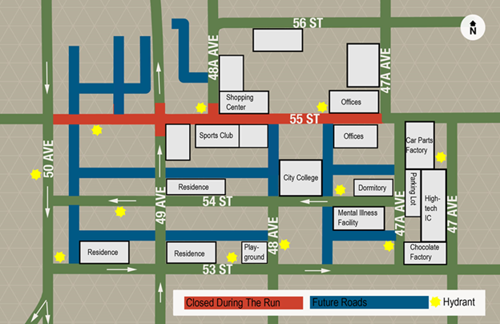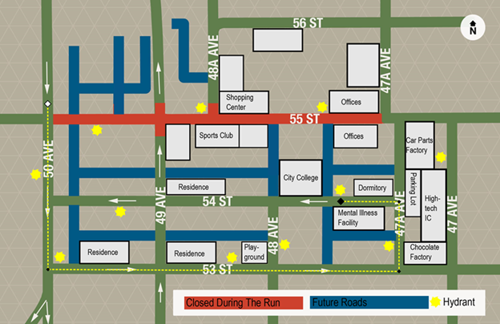(Last Updated: February 2026)
The CPS firefighter test (Cooperative Personnel Service Test) is a challenging cognitive ability and behavioural test that is used in the hiring process of numerous fire departments in Canada and the US to select suitable candidates.
By combining complex questions and a tight time limit of under a minute per question on average, the CPS fire test is not one to be taken lightly.
On this page we will review essential information regarding the test, and answer CPS practice test questions that will give you a glimpse of what to expect.
What Is the CPS Firefighter Test?
The CPS firefighter test (administered by CPS HR Consulting) is a standardized cognitive and behavioral assessment used by 200+ fire departments across Canada and the United States. It measures the reasoning and judgment abilities required to perform effectively as a firefighter, covering six sections across seven cognitive and behavioural skill areas — all within a strict 2.5-hour time limit and 100 questions.
The CPS test is highly competitive by design. A passing score of 70 is typically required, but passing alone isn't enough — departments rank all candidates on an eligibility list by final score, and hire from the top of that list. In competitive hiring cycles with hundreds of applicants and limited openings, candidates often need to score in the 90th percentile or higher to have a realistic chance of being hired. Reports from prep providers suggest fewer than 20% of candidates pass the CPS in many departments, though this figure varies by jurisdiction and is not officially published by CPS HR.
What makes the CPS exam distinct from generic firefighter tests is its vendor-specific structure. Candidates who prepare with general firefighter study materials frequently find that the question formats, time pressure, and cognitive demands don't match what CPS actually tests. Preparing specifically for the CPS format is the difference between knowing the material and being ready for how CPS presents it.
In the following sections, we'll break down each of the seven CPS test sections, walk through the cognitive and behavioural areas assessed, and provide CPS-style practice questions — so you know exactly what to expect on test day.
Question 1 - Reading Comprehension
Question 2 - Understanding Oral Information
Question 3 - Mathematical Ability
CPS Numerical Questions
Firefighters use a lot of math in their operations, and must be able to perform complex calculations while under the pressure of performing life-saving activities. For example, firefighters must be able to understand what hose length is needed to reach the scene of the fire, which ladder is the correct height, or how much water is still in the tank and if it is sufficient. The section contains multiple-choice questions that cover two main aspects of mathematical ability: word problems and arithmetic reasoning.
Question 4 - Mechanical Ability
Question 5 - Analytical Ability (Maps and Diagrams)
Question 6 - Teamwork, Public Relations, and Community Living
What Are Situational Judgement Test (SJT) Questions?
This section is similar to a personality test, but with a focus situational judgment, i.e. how you are likely to react in the daily interpersonal interactions typically encountered in fire departments and on the job as a firefighter.
The reason this section is included in the CPS test is that firefighters must live and work together for extended periods in close quarters, as well as interact with civilians experiencing extremely difficult moments. Firefighters are therefore expected to hold certain personality traits that will ensure they can handle these situations professionally.
Question 7 - Written Communication
Did You Know? Less Than 20% Pass the CPS
The sample questions above cover every section of the CPS exam — but passing requires repeated, timed practice across all seven sections. Our CPS Firefighter Prep Course gives you full-length practice tests, detailed answer explanations, and section-specific study guides built to match the real exam format.
CPS Firefighter Test FAQs
The CPS Exam is typically taken in-person in a location selected by your department. The test is proctored.
No. Calculators are not allowed on the CPS firefighter test.
After completing the CPS, which is the written exam section of the hiring process, several steps will typically follow. The process may take several weeks to several months, and it may be a good idea to ask your recruiters what to expect.
The CPAT, or physical ability test, is the phase many prospective firefighters are concerned about. However, even candidates who are not in shape can usually reach the goals set by the physical exam if they begin practicing several weeks ahead of time.
Aside from the written and physical exams, many departments will require a psychological test, a background check, a medical evaluation, and a drug screening.
Some may also schedule in-person interviews or invite you to participate in an "assessment center", which usually involves group exercises.
Yes. Our practice tests are calibrated to match the exact format, question types, and time pressure of the real CPS exam. In fact, we intentionally make our practice slightly harder than the real test — so when you walk in on test day, you feel over-prepared, not shocked. If your PrepPack doesn't match your actual test, we'll provide a full or proportional refund.






